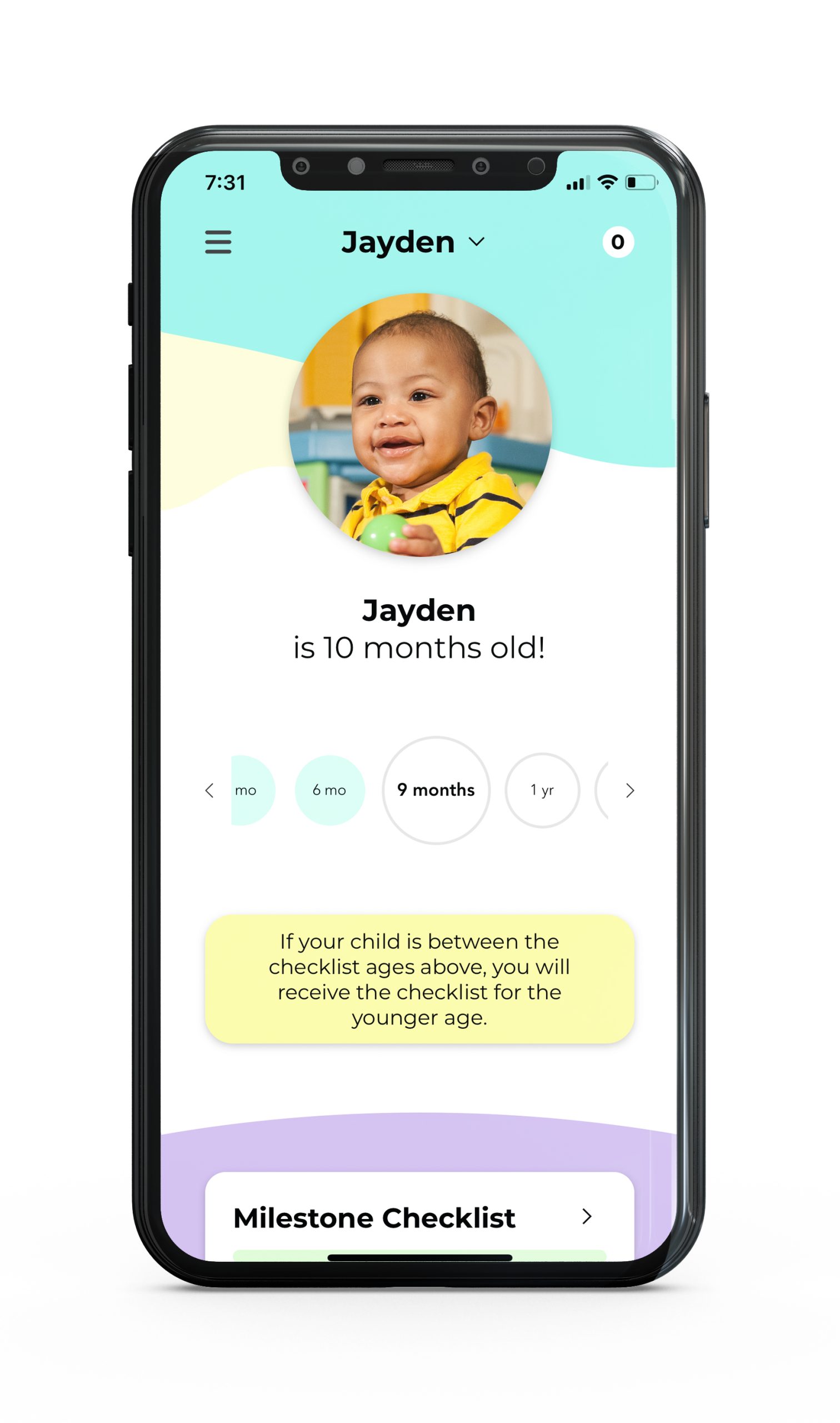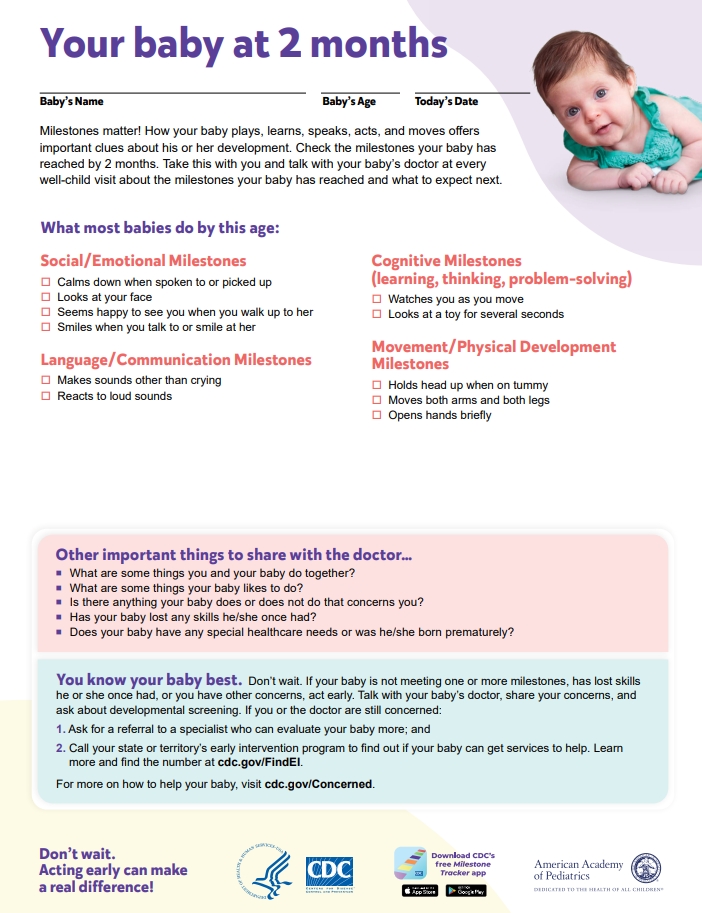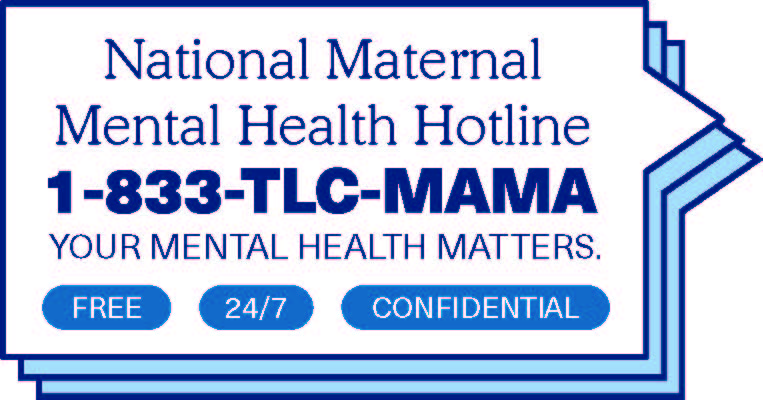What to know
You already have what it takes to help your young child learn and grow. Watch your child’s amazing progress by tracking his or her developmental milestones—how he or she plays, learns, speaks, acts, and moves—and sharing that progress with your child’s doctor at every check-up.

Free Tools to Help you Track your Child's Milestones
CDC's Milestone Tracker App
CDC's Milestone Tracker app - now available in Spanish! Track your child's milestones with CDC's FREE Milestone Tracker app, now available for iOS and Android in both English and Spanish. Interactive checklists with photo and video examples of developmental milestones help you know what to look for in your child.

Milestone Checklists
Complete a milestone checklist for your child’s age to track and celebrate the milestones that he or she is reaching.

Milestones Matter for Families!
Amazing books for families
Baby's Busy Day – Being One is So Much Fun!
Baby's Busy Day is the story of a one-year-old puppy who is having a very busy day! Keep an eye out for the paw prints to learn what one-year-old milestones to look for in your baby, and the hearts for tips on how you can help!
Where is Bear? – A Terrific Tale for 2-Year-Olds
Where is Bear? is a terrific tale for 2-year-old children and their families! This interactive book encourages children to help Tiger and his forest friends in their search to find Bear. Look for the leaf at the bottom of each page and learn about your own 2-year-old’s milestone moments!
Amazing Me — It's Busy Being 3!
In Amazing Me — It's Busy Being 3! Joey, a 3-year-old kangaroo, shows what he can do in one AMAZING day. Look for pages with koalas to find a star that helps you learn about your child's milestones as you read together.
More Resources to Support Child Development
Talking is Teaching: Talk, Read, Sing
"Talking is Teaching: Talk, Read, Sing" is a public awareness and action campaign that helps families recognize their power to boost their children's early brain and vocabulary development through simple, everyday actions.
Vroom has brain-building tips to support your child's development. Use these tips with your child during their first 5 years to help give them a strong base for lifelong learning.
- Download the Milestones Matter with CDC and Vroom! poster as a helpful resource for tracking your child's development and learning about brain building tips. English | Spanish
Zero to Three has science-based information and tools designed to help families and caregivers nurture their young children's development.
Other Helpful Resources for Families
National Maternal Mental Health Hotline
The National Maternal Mental Health Hotline is a free, confidential resource staffed by professional counselors that is available 24/7, via call or text, at 1-833-TLC-MAMA to respond to the mental health needs of pregnant women, new moms, their families, and the communities that support them. The Hotline offers help in English and Spanish, with translation services in over 60 languages.

CDC’s Infant and Toddler Nutrition website brings together existing information and practical strategies on feeding healthy foods and drinks to infants and toddlers, from birth to 24 months of age. Families and caregivers can explore these pages to find nutrition information to help give their children a healthy start in life.
Help Me Grow systems make it easier for families to support their child's development and help connect them to early intervention and other community-based services. Click here to see the national map of Help Me Grow affiliates. If your state has one, you will find their local website.
Easter Seals provides families with FREE access to the Ages & Stages Questionnaires®, Third Edition, one of many general developmental screening tools. Click here to learn more and take the questionnaire. Be sure to share the completed questionnaire and results with your child's doctor.
HealthyChildren.org is a pediatrician backed parenting website that provides information and recommendations related to child health, guidance on parenting issues, and more from the American Academy of Pediatrics.
JITP features many resources that provide parents with the information they need to support and guide the growth of their child.
Family-to-Family is an organization dedicated to making one-to-one connections between families with ‘enough to share’ and families struggling with the challenges of poverty.
Family Voices is a national network of families of children and youth with special health care needs and disabilities that promotes partnership with families in order to improve healthcare services and policies for children.
As your child grows and develops, there are many things you can do to help your child. These links will help you learn more about positive parenting, safety, and health at each stage of your child’s life. Find tips for positive parenting and child safety according to the age groups below.
Parent to Parent programs provide emotional and informational support to families of children who have special needs most notably by matching parents seeking support with an experienced, trained ‘Support Parent’.
State Children's Health Insurance Program (SCHIP)
Your children may be eligible for free or low-cost health insurance. Every state in the nation has a health insurance program for infants, children and teens. The insurance is available to children in working families.
Physical Developmental Delays: What to Look For
Physical Developmental Delays is a tool for families concerned about the physical development of their child. The tool reinforces that families know their child best and should trust their instincts.
Support for Social and Emotional Learning
The relationship between school staff and families can encourage student learning at home and at school. Learn more about how you can work with your child’s school to support social and emotional learning.
